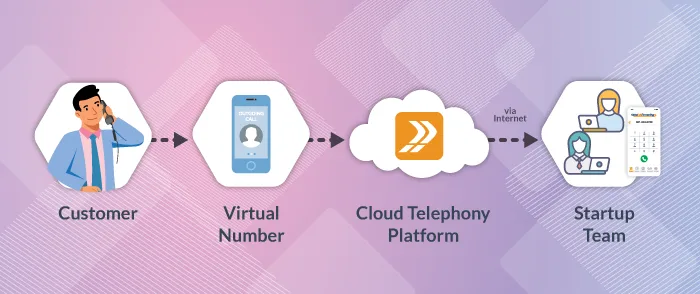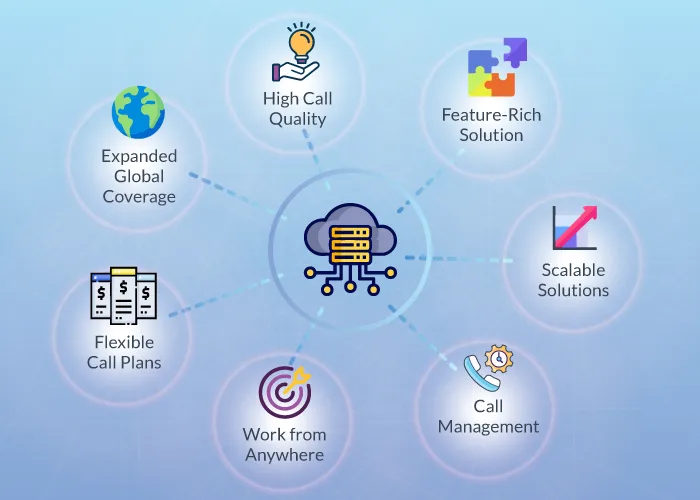Over 150 million startups operate globally, with approximately 50 million new businesses entering the market each year, highlighting the exceptional growth of the global tech startup ecosystem. For tech startups, where competition is fierce and growth depends on speed and agility, reliable communication is no longer optional—it’s mission-critical.
Making a good impression on your target market is crucial for launching a successful business. Whether it’s a hospitality sector, HR consultancy, food delivery platform, or other, every emerging business can create a strong market presence by using innovative, tech-driven strategies.
One such strategy is adopting cloud-based technologies, particularly cloud telephony, also known as Voice over Internet Protocol (VoIP). In this environment, cloud-based technologies help teams move faster, scale learners, and stay competitive. Cloud telephony routes calls over the internet, simplifying operations and making business expansion more seamless, enabling startups to manage customer conversations from anywhere.
So, let’s explore why integrating cloud telephony is not just beneficial but absolutely essential for tech startups in this competitive business landscape.
In this blog, we’ll cover:
Importance of Cloud Telephony for Tech Companies
Cloud telephony is a type of UCaaS that integrates all company communication requirements onto a single, seamless platform. This enables tech companies and managed service providers to access new markets at a reasonable price and expand beyond its current geographic boundaries.
The acceleration of technological transformation, particularly during the COVID-19 pandemic, underscored the urgent need for scalable cloud solutions. As a result, many companies moved to tech phone solutions to maintain business continuity.

The global cloud telephony market is on a robust upward trajectory, hyped by the growing need for agile and cloud-based communication tools. It has emerged as a pivotal technology for tech startups aiming to maintain seamless communication. By using internet-based communication systems, startups can enhance operational agility, reduce costs, and improve customer engagement.
For tech companies, cloud telephony enables:
- Seamless scalability without costly hardware.
- Global customer reach (160+ countries) with local and toll-free numbers.
- Business continuity, even during disruptions.
- Data-driven insights through analytics and CRM integrations.
- Call tracking across different regions and campaigns.
Integrating cloud telephony into your startup’s ecosystem is seamless. There’s no need for any complicated installations. A softphone on a computer, tablet, or smartphone can replace traditional desk phones. The service is managed through a user-friendly online dashboard, giving you complete control over phone numbers, call routing, users, and other settings.
So, incorporating cloud telephony helps tech startups to build a robust, scalable communication infrastructure, supporting growth, improving efficiency, and enhancing customer relationships in a highly competitive business landscape.
Benefits of Cloud Phone Solutions for Tech Startups

An alternative to traditional phone lines, cloud telephony is a communication tool that directs calls via the internet. Tech startups may benefit from cloud telephony:
- High Call Quality: Deliver HD voice through VoIP with fewer dropped calls or jitter. Maintain professionalism when speaking with investors, partners, or global customers.
- Expanded Global Coverage: With virtual phone numbers like local and toll-free numbers in multiple countries, startups can connect with clients worldwide while still feeling local and accessible.
- Call Recording and Analytics: Track conversations, enhance customer satisfaction, and learn more about how customers behave.
- Advanced IVR: Use automated prompts, advanced routing techniques, and preset rules to route incoming calls.
- Call Forwarding and Routing: Optimize call flow to ensure that calls reach the appropriate person, wherever they may be.
- CRM Integration: Provides agents with caller information by seamlessly integrating with CRM platforms.
- Scalable Solutions: Cloud phone systems are highly scalable, making them a vital choice for tech startups that are expanding rapidly.
- Flexible Call Plans: Startups can save money and pay for just what they need with plans that can be upgraded to match changing business demands.
- Work from Anywhere: Remote and hybrid work models are made possible by employees’ ability to make and receive calls from any internet-connected device.
- Call Management: Features like call routing, local caller IDs, etc., simplify inbound and outbound call handling.
Cloud Telephony in Action: 7 Ways Tech Startups Use Cases
By using tech phone solutions, startups can enhance customer interactions, expand globally, and integrate with existing technologies. Here are key use cases:
- Improve Customer Interaction & Satisfaction
- Increase Answer & Pick-Up Rates
- Establish Local & Global Presence
- Integrate with Saas Platforms
- Get Remote Technical Support
- Set Up a Global Tech Service Desk Hotline
- Maintain Voice Continuity
1. Improve Customer Interaction & Satisfaction
A well-designed IVR efficiently routes callers to the correct department, reducing wait times and frustration. Startups can record and monitor calls for quality assurance and training, allowing teams to improve overall performance. This all helps in faster issue resolution and higher customer satisfaction.
On top of this, your teams can use AI call summaries, transcriptions, and custom reports to better understand customer pain points, helping deliver proactive service that reduces churn.
2. Increase Answer & Pick-Up Rates
People are more likely to answer a call if it looks familiar and local. With cloud telephony, startups can use local numbers so calls don’t feel like random international spam. Sales teams can also plan calls around a prospect’s time zone and working hours, which makes connections more likely.
If someone doesn’t pick up, calls can be retried later or followed with a quick voicemail or text. And with a local phone number, you can expect more callbacks or returned calls. Beyond that, teams can analyze call data to spot patterns, such as the best times to connect, and refine outreach accordingly.
Together, these practices make sales outreach more effective and significantly improve answer and pick-up rates.
3. Establish Local & Global Presence
By utilizing virtual phone numbers from target markets, businesses can appear local to customers while also gaining additional advantages. Beyond building local trust, virtual numbers help reduce overhead costs, enable regional support, and provide insights into customer behavior—making global expansion more efficient and data-driven.
They cut down the costs of setting up physical locations and offices, while still allowing you to serve customers in multiple regions. Startups can get localized support with familiar area codes, build trust with regional customers, and route calls to a single support team anywhere in the world. Plus, these numbers give valuable insights into call volume and customer behavior across markets, helping founders test demand, research new regions, and scale into them with confidence. These MSP phone solutions also help managed service providers offer global coverage and call data tracking for their clients.
Check out our country coverage to see what regions and countries we cover.
4. Integrate with SaaS Platforms
Cloud telephony integrates with popular CRM and helpdesk platforms like Salesforce, HubSpot, and Zendesk. Such integrations create a unified communication environment that centralizes call logs, customer data, and communication history. This eliminates the need for agents to switch between multiple applications, simplifying workflows and providing a comprehensive view of customer interactions.
5. Get Remote Technical Support
For tech startups, reliable remote support is critical to maintaining customer trust and satisfaction. With cloud telephony, employees can make and receive calls from any internet-connected device, ensuring issues are resolved quickly, no matter where the team is located.
Advanced features like intelligent call routing, forwarding, and IVR reduce wait times and connect customers to the right experts instantly. This flexibility not only builds strong customer relationships but also helps startups scale support operations without the heavy costs of setting up physical call centers.
6. Set Up a Global Tech Service Desk Hotline
For fast-growing startups, technical issues and IT requests can quickly overwhelm internal teams if not managed effectively. A global service desk hotline helps scale technical support beyond a single location. With features like international toll-free and local numbers, startups can provide employees and users with easy, free access to IT help desks, regardless of country or time zone.
Advanced routing ensures calls reach the right technician—whether by skill, department, or schedule. Use call logs, recordings, and transcriptions to provide a record of troubleshooting interactions, which improves accountability, speeds up resolutions, and supports training.
For startups operating remotely or across multiple regions, this kind of hotline delivers round-the-clock support, reduces downtime, and ensures smooth operations as the business scales.
7. Maintain Voice Continuity
With a global network built on tier-1 carriers and local partnerships, cloud telephony ensures resilient voice communication even during disruptions. Calls are routed through multiple global PoPs with built-in redundancy and proactive monitoring to deliver 99.999% uptime. Startups benefit from automatic rerouting, failover options, and secure data backups, so conversations with clients and stakeholders stay seamless no matter the circumstances.
Cloud Telephony Made Simple With Global Call Forwarding
Cloud telephony is rapidly becoming the backbone of modern business communication, particularly for tech startups seeking to scale and operate globally. Switching to cloud telephony with Global Call Forwarding provides tech startups with the flexibility, scalability, and efficiency necessary to thrive in the business market.
With high-quality voice calls, virtual numbers, CRM integration, and disaster recovery support, your startup can simplify communication, cut costs, and expand globally without investing in complex infrastructure. Whether managing a remote team or handling peak call volumes, cloud telephony ensures your business stays connected and responsive.
Curious about how Global Call Forwarding can support your growth? Book a demo today or chat with our team online!
Related: Increase Healthcare Accessibility with Cloud Telephony


